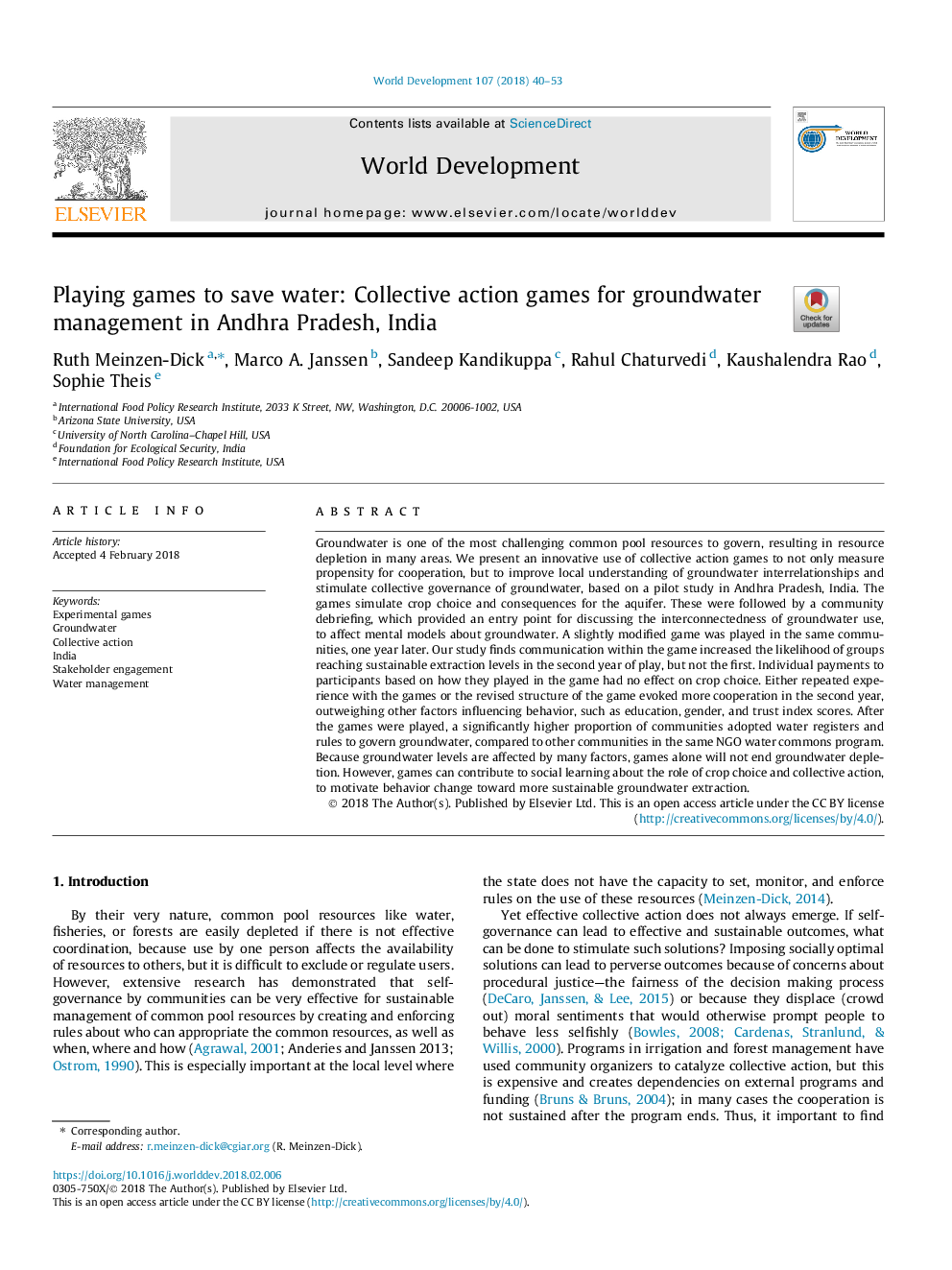| کد مقاله | کد نشریه | سال انتشار | مقاله انگلیسی | نسخه تمام متن |
|---|---|---|---|---|
| 7391686 | 1481111 | 2018 | 14 صفحه PDF | دانلود رایگان |
عنوان انگلیسی مقاله ISI
Playing games to save water: Collective action games for groundwater management in Andhra Pradesh, India
ترجمه فارسی عنوان
بازی کردن بازی برای صرفه جویی آب: بازی اکشن جمعی برای مدیریت آب های زیرزمینی در آندرا پرادش، هند
دانلود مقاله + سفارش ترجمه
دانلود مقاله ISI انگلیسی
رایگان برای ایرانیان
کلمات کلیدی
بازی های تجربی، آب های زیرزمینی، اقدام جمعی، هند، مشارکت ذینفعان، مدیریت آب،
ترجمه چکیده
آبهای زیرزمینی یکی از چالش انگیزترین منابع استخر مشترک برای کنترل است، که منجر به کاهش منابع در بسیاری از مناطق می شود. ما در حال حاضر استفاده نوآورانه از بازی های اکشن جمعی نه تنها برای سنجش تمایل به همکاری، بلکه به منظور بهبود درک بین المللی از ارتباطات آب های زیرزمینی و تحریک مدیریت جمعی آب های زیرزمینی، بر اساس یک مطالعه آزمایشی در اندرا پرادش هند. بازی ها شبیه سازی انتخاب محصول و عواقب آن برای آبخوان است. این ها به دنبال یک نشست عمومی بود که نقطه ورود را برای بحث در مورد ارتباط بین استفاده از آب های زیرزمینی فراهم کرد تا مدل های ذهنی در مورد آب های زیرزمینی را تحت تاثیر قرار دهد. یک بازی کمی اصلاح شده در یک جوامع مشابه یک سال بعد انجام شد. مطالعه ما ارتباطات درون بازی را افزایش می دهد احتمال اینکه گروه ها در سال دوم بازی به سطح سطوح پایدار دست پیدا کنند، اما نه برای اولین بار. پرداخت های فردی به شرکت کنندگان بر اساس نحوه بازی در این بازی بر انتخاب محصول تأثیری نداشت. هر دو تجربه مکرر با بازی ها یا ساختار تجدید نظر شده در بازی باعث شد که همکاری بیشتر در سال دوم موجب برانگیختن سایر عوامل موثر بر رفتار، مانند نمرات تحصیلات، جنسیت و اعتماد شود. پس از بازی، بخش قابل ملاحظه ای از جوامع ثبت آب و قوانین برای کنترل آب های زیرزمینی، در مقایسه با سایر جوامع در همان برنامه های عمومی غیر دولتی آب ثبت نام کرد. از آنجا که سطح آب های زیرزمینی تحت تاثیر عوامل بسیاری قرار دارد، بازی ها به تنهایی از بین نمی روند. با این وجود، بازی ها می توانند به یادگیری اجتماعی در مورد نقش انتخاب محصول و اقدام جمعی کمک کنند تا انگیزه تغییر رفتار را به سوی بهره برداری پایدارتر از آب های زیرزمینی.
موضوعات مرتبط
علوم انسانی و اجتماعی
اقتصاد، اقتصادسنجی و امور مالی
اقتصاد و اقتصادسنجی
چکیده انگلیسی
Groundwater is one of the most challenging common pool resources to govern, resulting in resource depletion in many areas. We present an innovative use of collective action games to not only measure propensity for cooperation, but to improve local understanding of groundwater interrelationships and stimulate collective governance of groundwater, based on a pilot study in Andhra Pradesh, India. The games simulate crop choice and consequences for the aquifer. These were followed by a community debriefing, which provided an entry point for discussing the interconnectedness of groundwater use, to affect mental models about groundwater. A slightly modified game was played in the same communities, one year later. Our study finds communication within the game increased the likelihood of groups reaching sustainable extraction levels in the second year of play, but not the first. Individual payments to participants based on how they played in the game had no effect on crop choice. Either repeated experience with the games or the revised structure of the game evoked more cooperation in the second year, outweighing other factors influencing behavior, such as education, gender, and trust index scores. After the games were played, a significantly higher proportion of communities adopted water registers and rules to govern groundwater, compared to other communities in the same NGO water commons program. Because groundwater levels are affected by many factors, games alone will not end groundwater depletion. However, games can contribute to social learning about the role of crop choice and collective action, to motivate behavior change toward more sustainable groundwater extraction.
ناشر
Database: Elsevier - ScienceDirect (ساینس دایرکت)
Journal: World Development - Volume 107, July 2018, Pages 40-53
Journal: World Development - Volume 107, July 2018, Pages 40-53
نویسندگان
Ruth Meinzen-Dick, Marco A. Janssen, Sandeep Kandikuppa, Rahul Chaturvedi, Kaushalendra Rao, Sophie Theis,
